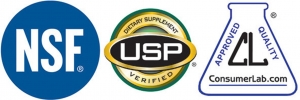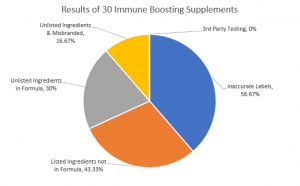3rd Party Certification
Jun 5 / CATEGORY: Nutrition
Estimated Read Time: 2 minutes 45 seconds
Almost all of us have been exposed to supplements: Protein powder, pre-workout, creatine, or multivitamins. 3rd party certification is an important tool for consumers to ensure the safety and accuracy of their products. Read on to understand why.
Supplements are dietary ingredients consumed orally to augment one’s diet.
Supplements cannot be advertised as treatment for a disease or a medical condition unless validated by evidence.
While traditional food items have FDA regulated ingredient and nutrition fact labels, supplements are not required to undergo FDA or other agency verification before being brought to market. Supplements are thus considered non-verified.
The problem: Without verification, the contents of a supplement may or may not be what is actually included in the container. This can lead to uncertainty about a product’s safety and effectiveness.
What guarantee do we have that what is advertised on the bottle is accurate?
Enter: 3rd party certification.
3rd Party Certification is testing carried out by an outside organization unaffiliated with the supplement company, serving as a “3rd party”. A supplement is analyzed to certify that what is claimed on the label is in the bottle in the quantity specified, that product formulation is in accordance with its toxicology report, and that the product contains no undeclared or dangerous levels of contaminants.

Image sourced from the New York Times^²
After 3rd party certification, supplements are labeled to denote that they meet product safety standards. Common 3rd party agencies are:
-National Sanitation Foundation (NSF)
-United States Pharmacopeia
-ConsumerLabs
Stay safe and keep an eye out for these 3rd party logos the next time you consider purchasing a supplement!
It is not uncommon that a non-verified supplement contains potentially dangerous levels of illegal, banned, or undeclared ingredients. Consumption of non-3rd party certified supplements can cause critical health issues. Although there are rules and regulations regarding supplement labeling, without 3rd party certification, ingredient safety and label accuracy is not guaranteed.
In a 2022 study, 30 non-verified products were investigated that claimed to “boost” one’s immune system. 1 Of the 30 products tested, the results
 indicated:
indicated:
-17 had inaccurate labels
-13 had ingredients listed that were not included in the product
-9 had ingredients included that were not listed on the label
-5 had unlisted ingredients and were misbranded
-0 had 3rd party testing
-13 had accurate labeling based on product analysis:
-10 of the 13 were deemed as “likely okay” and/or “less risky” to health
These results highlight the importance of 3rd party certification when selecting a supplement. Keep this in mind when reading labels and considering supplement purchases.
Although supplements do not undergo required testing and strict regulations like processed foods, that doesn’t mean all supplements should be avoided. In fact, supplements can be beneficial for select individuals based on certain medical and health criteria.
Next time you hit up the shelves for some new pre-workout, protein powder, or vitamins, keep an eye out for brands that have been 3rd party certified. This will put your mind at ease since there is no misinformation between what is on the label and what you are consuming.
Do you have further questions regarding supplement usage or how to ensure that a product is 3rd party certified? Purchase a 3-session nutrition package or a free speed session with RecSports’ registered dietitian and certified intuitive eating counselor.
This post was co-written by:
Jessie is a Registered Dietitian and Assistant Director for Fitness & Wellness at University of Florida’s Department of Recreational Sports where she does individual nutrition counseling and coaching with the UF community. Follow her on Instagram for more nutrition tidbits.
Rachel is a Program Assistant with Nutrition Services at the Department of Recreational Sports. She recently graduated from the University of Florida with a B.S. in biology and a minor in nutritional sciences.
References:
1. Crawford, C., Avula, B., Lindsey, A. T., Walter, A., Katragunta, K., Khan, I. A., & Deuster, P. A. (2022). Analysis of Select Dietary Supplement products marketed to support or boost the immune system. JAMA Network Open, 5(8). https://doi.org/10.1001/jamanetworkopen.2022.26040
2.O’Connor, A. (2015, February 12). Knowing what’s in your supplements. The New York Times. Retrieved March 30, 2023, from https://archive.nytimes.com/well.blogs.nytimes.com/2015/02/12/107141/
